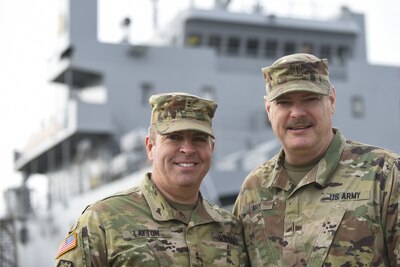By Senior Airman Kaylee Dubois 633rd Air Base Wing
JOINT BASE LANGLEY-EUSTIS, Va., Feb. 2, 2018 — Nathaniel
Layton grew up in Greenville, Tennessee, just a half-hour away from Knoxville,
Tennessee, where his cousin, Patrick May, lived.
Although the two only met once growing up, today they are
closer than ever and owe their chance to grow together, personally and
professionally, to the Army.
Coming from a long line of military members, both men had a
feeling they would end up joining the military in one capacity or another.
Now an Army Chief Warrant Officer 2 assigned to the 97th
Transportation Company, 7th Transportation Brigade here, Layton works as a
chief engineer on a Landing Craft Utility vessel.
Furthermore, May, a Chief Warrant Officer 5, works as the
chief maritime qualification director for the Office of the Chief of
Transportation here. The two never imagined they would end up working together
in the watercraft field.
“I was an aviation mechanic in the U.S. Marine Corps and
loved everything about it,” Layton said. “In 1995, they gave the choice of two
different careers to cross-train into, but I knew that I wouldn’t enjoy working
in them. I knew getting out was the best way to go.”
Joining the Army
After ending his service in the Marine Corps, Layton started
his own contracting business. While working in the civilian sector for 15
years, his cousin worked his way up the ranks in the Army.
When the economy declined in the early 2000s, Layton joined
the Army.
“I missed the Marine Corps the whole time I was out,” Layton
said. “The first day I put the uniform back on, it felt like I had never left.”
With a few years already under his belt, Layton knew he was
ready to apply for a warrant officer position. While confiding in his father
about this decision, his father told him to reach out to his cousin, Pat, who
was already a warrant officer.
Getting in contact with May was one of the best things that
he did to jump-start his warrant officer career, Layton said. May helped Layton
get his foot in the door, and soon after, he was on his way to Warrant Officer
Candidate School at Fort Rucker, Alabama.
Watercraft Field
“I suggested joining the watercraft field,” May said. “I
knew Nate would be the perfect fit for the job.”
For both the soldiers, being a mariner runs through their
veins. They attribute their love of the water to their ancestors, who were
known as the King’s Watermen in medieval England.
“I sometimes wonder if our gravitation toward the field goes
back to our past,” May said. “If not, it certainly is quite the coincidence.”
From day one on the job, May noted he was a natural on the
water. Whether sailing boats or fixing them, he had a knack for watercraft, a
military occupational specialty he chose when he enlisted in the Army after
high school.
“I saw the video of the watercraft field in the recruiter’s
office and thought it would be a cool job,” May said. “I fell in love with the
mission; the boats, the traveling. And, 33 years later, I’m still here.”
Stationed Together
This series of events led to the two soldiers being
stationed together at Fort Eustis, where the primary mission is transportation.
Now sharing the same mission, Layton and May spend time
together often, either helping each other in their field or just bonding over
remodeling a kitchen.
“I consider Pat one of my biggest mentors, in and out of
work,” Layton said. “He’s been a warrant officer for most of his career and
he’s an expert in his field. Outside of work, he’s there for me 24/7 and vice
versa. It’s great knowing you have family close by.”
Both men suggest young service members continuously seek out
mentors throughout their careers. Even as the most senior vessel director, May
said he wouldn’t be as successful without the people he leans on every day.
Creeping up to his retirement and with two trips around the
world on his resume, May says he’s ready to pass his legacy on to Layton.
Although they didn’t share much growing up, now, through
their shared service, the cousins continue to keep the nation’s waters and
citizens safe by serving on the Army’s most versatile vessels.









No comments:
Post a Comment